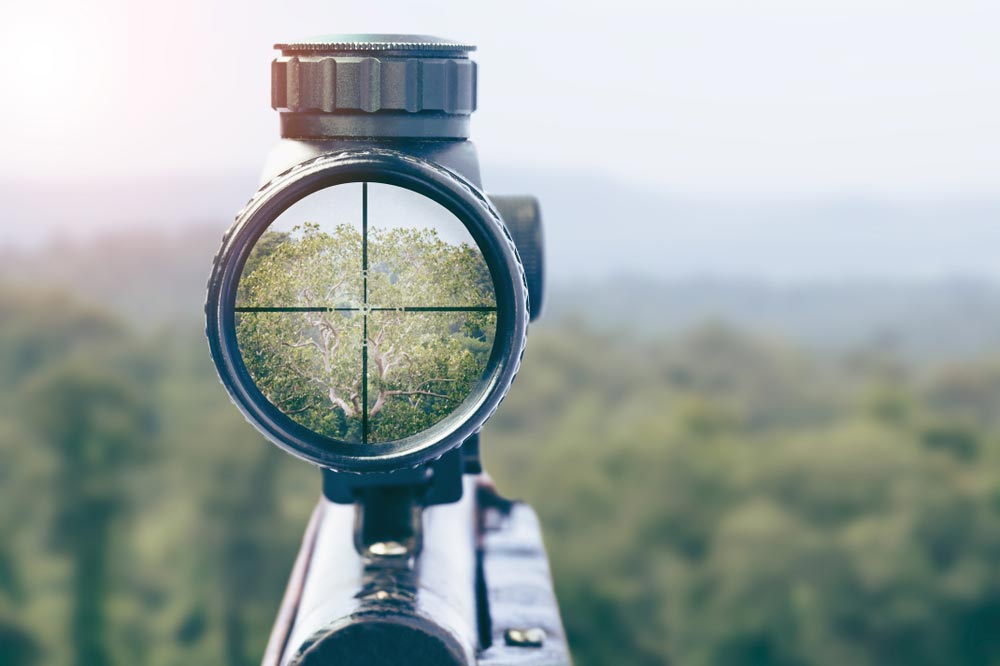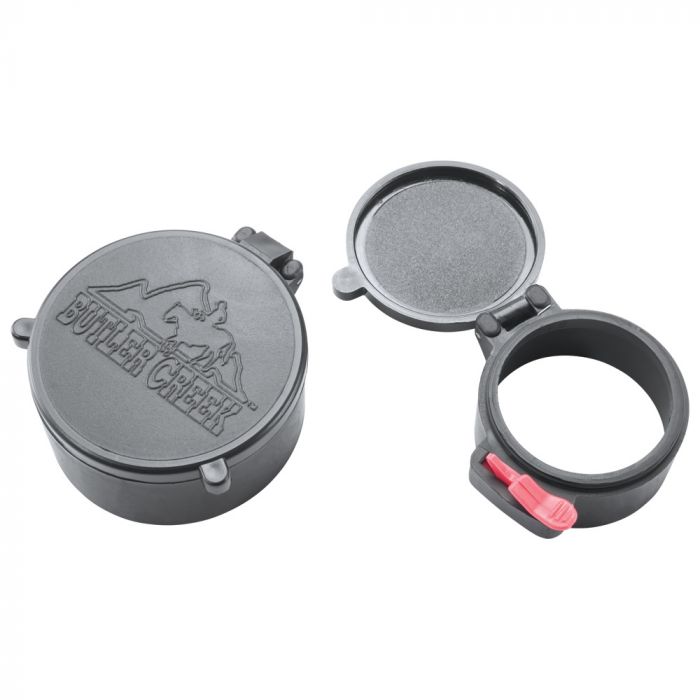If a hunter or rifle owner handles their rifle scope lens carelessly, it would soon disappoint them. Some people clean their rifle scope lenses with their shirts or any cloth or napkin that’s lying around. This is not a good practice! No one expects that everyone should know how to clean rifle scope lens/optics excellently, but it’s surprising how many people don’t have a clue that this component needs to be properly maintained.

Most hunters and long-range shooters spend the majority of their time cleaning their firearms’ metal bodies and spend little or no time cleaning their lenses. You might not be able to make the most of your rifle’s optic until you understand how important it is. For instance, as a sniper, your career and survival are dependent on your ability to spot and shoot your target. The same goes for a hunter. How can you achieve this without a clean rifle scope?
A rifle scope lens that has specks of dirt and debris makes the work even more difficult, especially for long range shots. A scratched lens from poor lens cleaning might also lead to a failed shot.
The cleaning practices outlined in this article are skills I’ve picked up throughout the years. It is possible to clean your rifle scope lens in such a way that it is spotless and free of debris. When it is done correctly, a cloudy scope problem would not arise.
Scope Covers or Scope Caps

By locking or closing your lens cap after each shot, you will significantly reduce the frequency of cleaning. The air is always dusty, and some of it will certainly end up on your lens when in use or when the scope surface is exposed. Investing in high-quality Rifle Scope Covers that act as a protective seal can help you keep your pricey scope in good condition.
How Often Do I Need to Clean My Rifle Scope Lens?
More is not always better when it comes to scope maintenance or lens cleaning. I strongly advise that you leave the optic of your rifle untouched unless you notice fingerprints, large wet spots, smudge, or dried dirt on the lens surface. If you notice any dirt or dust particle, just blow or brush them off.
Cleaning Supplies and Equipment Required
To execute any task correctly, you must have the proper tools. The same is true for cleaning a rifle scope lens. Using the recommended cleaning kit would help you preserve the optical surfaces of your objective lens. The following supplies should always be in your range bag.
Blower Bulb:
This accessory is available at any camera retailer. Shooters love canned air, but it might get you into trouble. If the can gets too close to being upside down, the liquid air will flow out and cause damage to the optics. Normally, this substance will leave a mark on your lenses as it dries, which you will need to wipe off later. A good lens cleaning will prevent a cloudy scope
Camel Hair Brushes:
The only brush that should be used on your rifle scope lens is a real Camel Hair Brush. Keep the brushes in a Ziplock bag and wash them on a regular basis with Ivory soap, allowing them to air dry before rinsing with lens cleaning alcohol. If you are not the thrifty type like me, then you can dispose them after use.
Good Lens Tissue:
A white lens tissue will suffice (no need for printed designs because they are not for fancy). Avoid using toilet paper or common facial tissues because they contain some silica and other grit that will damage your optics. Ensure that you put the lens tissue in a Ziplock bag and don’t leave it open for too long, only long enough to remove one sheet of tissue. Also, don’t pull a sheet out, set it down, then pick it up later to clean your lens. The tissue would have accumulated dust and this could harm your lenses.
Optic Cleaning Fluid:
The fluid produced and packaged as Optic Cleaning Fluid is actually 100% Isopropyl Alcohol. You can use the 90% which is often found in drug shops, but the rest 10% is made of water which we want to avoid. Whatever you do, do not use 70% because it would leave water marks on the lens you are intending to clean!
Because alcohol absorbs a lot of water from the air, keep it in a compact, well-sealed container when cleaning your lenses. If the alcohol absorbs water, you may notice water spots after cleaning your optics (when the alcohol is dried). The best scope cleaning solution is to just pick up a bottle of Optic Cleaning Fluid, which comes in a compact bottle. This is what I use because it is easily accessible and inexpensive.
Best Scope Lens Cleaner
There are several optical cleaning products available nowadays. Large optical equipment makers frequently make specific cleaning kits for optics and encourage using them with their own devices. Everything you need is already included in these packages. A universal gadget in the shape of a pencil called “Lens Pen” is a very practical and easy tool for cleaning optics. The “Lens Pen” is a brush made of soft natural hair (it removes dust particles from optical devices).
Lens Coating
Lens coating is a very delicate part of rifle scope surfaces. Military-grade coatings must pass a “cheesecloth” test, which involves rubbing the coating with cheesecloth until it is damaged. The key element here is that rubbing causes cumulative coating degradation. I’ve seen numerous pairs of binoculars, rifle scopes, and a number of telescopes where the users practically rubbed the coatings off in order to keep their optical device surface clean.
Polishing
After thoroughly brushing away any dirt and dust particles, you can then take your cleaning to the next level – polishing. A simple brush isn’t always enough to remove oil streaks, dried water spots, fingerprint smudges, and other dirt.
The same lens pen that can be used for dusting can also be used as a polishing instrument. Furthermore, a lens pen normally contains a non-liquid cleaning solution that can usually remove these difficult-to-clean stains. A microfiber cloth can reach the corners and grooves, therefore you can use a microfiber cleaning cloth to remove tough stains.
Does It Matter How I Clean My Rifle Scope Lens?
Lenses are made of a variety of glass qualities depending on the scope’s performance. Even though glass is a durable material, it can still be damaged. Our cloth accumulates different particles that are blown about in the air. Therefore, cleaning a piece of glass with such a cloth can result in scratches. When gazing through the scope, small scratches on the lens might cause a cloudy or hazy area, hindering your ability to focus on the target.
Pouring or spraying a liquid cleaner on a scope lens can make the seal fail. This might leave you with a large repair cost. The way you clean your rifle scope lens matters a lot, therefore, it is important that you follow adequate cleaning procedures.
How To Clean Rifle Scope Lens
There are several ways to clean the optical lenses of a rifle scope. The methods I’ve mentioned below have worked for me and many other top shooters. These scope cleaning procedures have been tested and found to be extremely successful in removing dirt, debris, fingerprints, dust, smudge, and wet spots from pricey scope lenses. Do not disassemble your optic in order to clean the insides. If you notice that your optical devices need internal cleaning, then you must return them to the manufacturer for cleaning. Follow the following scope cleaning instructions
WARNING: Before you proceed, make sure your weapon is not loaded!
Dust Removal: Before cleaning your optics, use the brush to remove any dust from the lens. Brush the lens lightly until there is no more dust on the glass. Sometimes, this step is enough and you may stop here.
Water Spot & Fingerprint: If you have fingerprints or wet stains on your lens, you will need to take a step further. Dampen a piece of lens paper with alcohol. Do not pour or spray alcohol or any other liquid directly over a lens. Brush the alcohol on the lens by dragging the lens paper from one side to another; use ONLY the weight of the lens paper to move the paper on the glass. The solvent (alcohol) is expected to do the work of stain removal. The paper is just a vehicle for administering the solvent safely.
After one swipe, throw away the lens paper and replace it. This will keep any dust from the initial lens paper from being dragged back over the lens and perhaps scratching it. If the fingerprint stains are stubborn, slightly add more pressure on the weight of the paper to remove them, but never place your thumb on the lens paper and begin scrubbing the lens. This will undoubtedly scratch your lens. Let the alcohol evaporate once you’re done.
If you carefully adhere to this scope cleaning instructions by using the recommended types of lens cleaner, you would enjoy your rifle scope.

Mike Hardesty is a published freelance gun writer. He also possesses specialized expertise in rifle scopes With dozens of articles and reviews published in Pew Pew Tactical, Snipercountry.com, and TTAG (The Truth About Guns), Mike is considered a firearms expert. His special area of expertise is handguns.
Mike is a long-time shooter. He has been punching paper targets, taking deer and other game and shooting at competitions since about 1975. Other related pursuits include reloading and bullet casting. He currently reloads for over 10 calibers, both handgun and rifle. His reloads, particularly for 9mm, were in great demand during the height of the ammo shortage among family and friends. He donated hundreds of rounds to informal shooting sessions. He was quoted as saying “I do not sell my reloads but I sure will help my guys shoot ’em for free!”. He has a few cherished firearms that he has inherited or otherwise procured — those are his favorites.
He earned B.S. and M.S. degrees from Indiana State University in 1974-1975.
He’s a firearm experts and is the founder of mhardesty.com.
